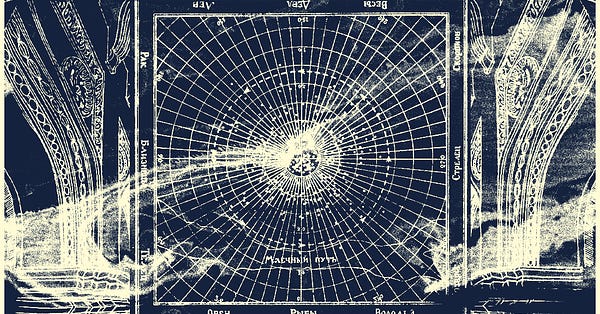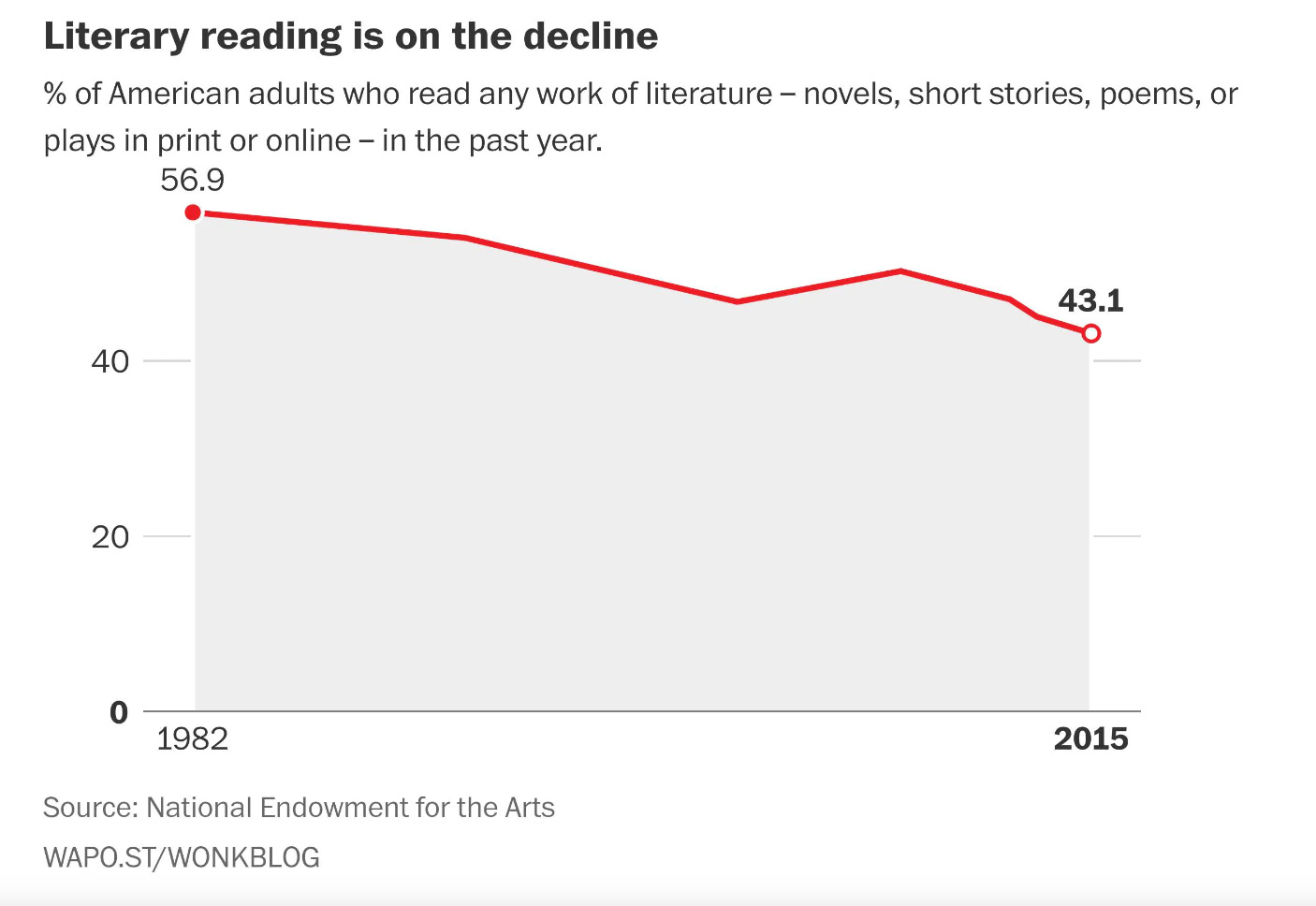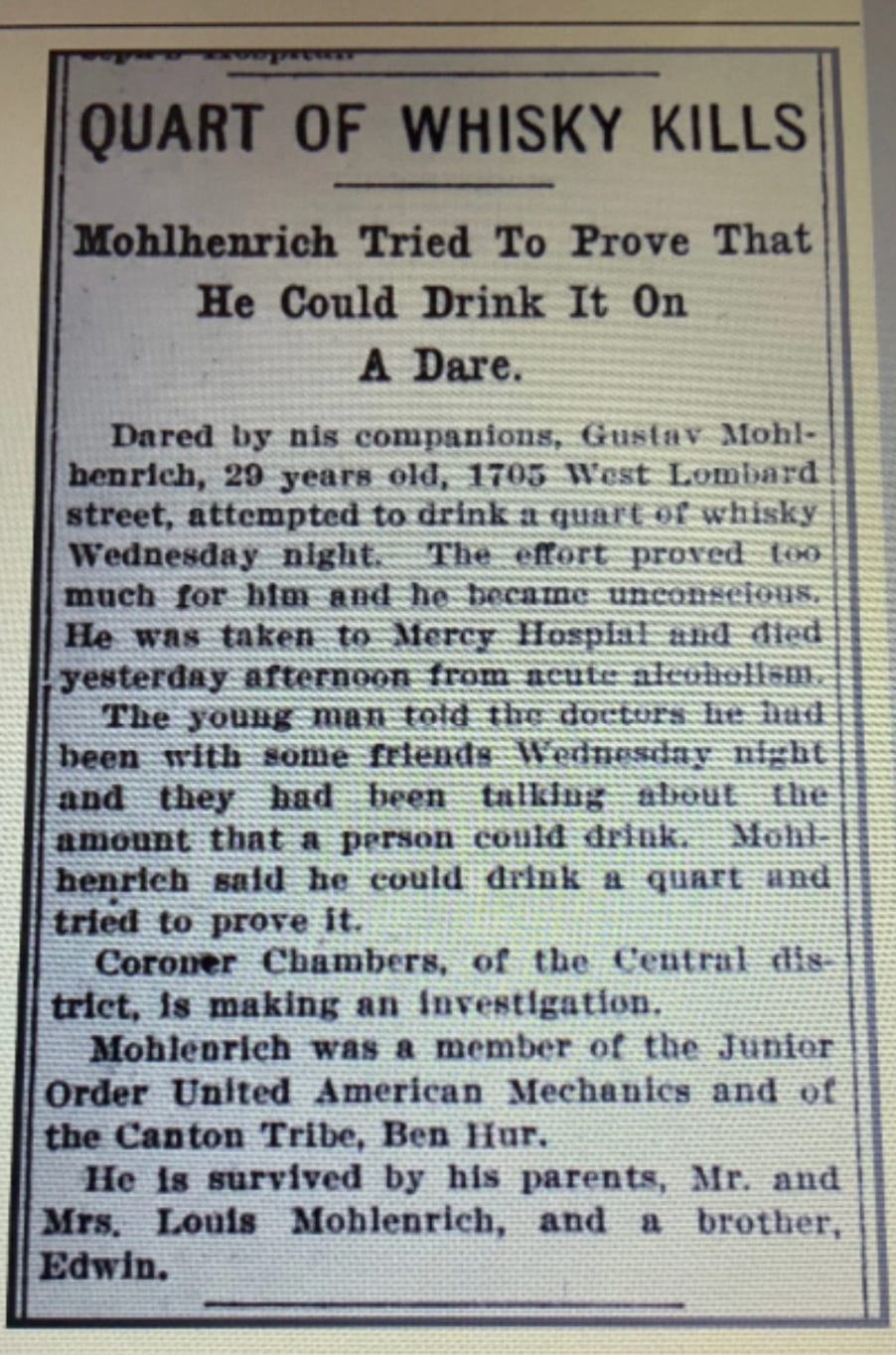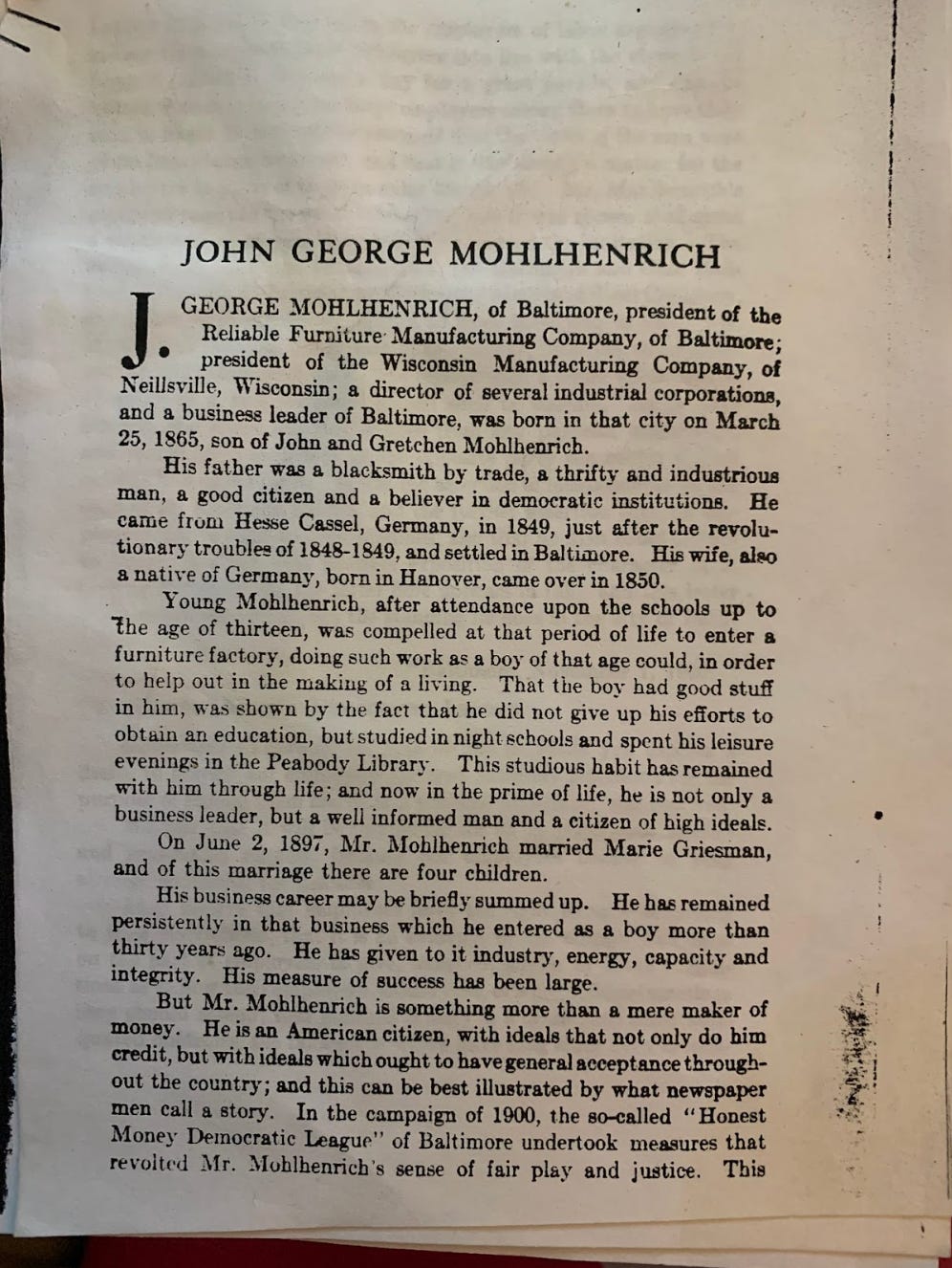很高兴与大家分享我最近发表在 Praxis Journal 上的一篇文章——您可以在下面阅读,但我建议您在他们的网站上阅读(我喜欢格式和插图)。
如果您不了解 Praxis,请查看他们的总体规划。摘录:
我们希望生活在能给我们一种归属感和归属感的社区,与分享我们的价值观和梦想的人一起生活。我们将在寻求建立一种基于旧见解的新文化中找到目标:归根结底,所有道德体系、社会体系和政治体系都是根据它们在人民中产生的活力来判断的。约翰·洛克引用西塞罗的话:salus populi suprema lex。人民的健康是至高无上的法则。我们渴望过上充满活力的生活。作为个人,通过美貌、力量和美德。作为一个社会,通过扩大艺术、商业和技术的视野。
以这个道德原初为我们的指南针,我们踏上了建设新城市的边疆。
关于故事和历史:问答
“GIOIA:嗯,这很有趣。在现代运动中,我说的大概是从 1914 年到第二次世界大战,所有的艺术、音乐、雕塑、绘画、文学和艺术都发生了巨大的转变,以各种形式变得更抽象、更概念化,更正式,不是在韵律和韵律的意义上,而是在这些结构设计方面。作为其中的一部分,对叙事存在普遍偏见。把故事放进去在某种程度上屈尊于愚蠢的观众,但事实是,人类需要故事。人们把他们的个人生活当作一个故事——哇,我的意思是我们可以。你需要很多故事的原因之一是,在每一个生命中,你的故事都会陷入僵局。
从某种意义上说,你必须修改自己生活的叙事,小说、诗歌、叙事的作用是给你丰富的叙事可能性,这样你就可以认识到,无论你现在的生活有多糟糕,有逃生,有救援,甚至可能,在希腊意义上,是一个 deus ex machina,一种拯救你的干预。我相信美国的自杀流行,美国的阿片类药物流行,尤其是在年轻人中,是在某种意义上无法控制自己生活故事的人群中。
故事中叙事的剥夺,我们大众文化中叙事的贬值,我认为已经造成了巨大的人力成本,包括创造力的丧失、生产力的丧失,最糟糕的是自杀、吸毒和死亡。”
一、故事
问:告诉我你对此有何看法——我有一个理论来解释为什么一切都出错了……
答:你当然知道。
问: ……为什么绝望的死亡(自杀、成瘾) 在上升,为什么看似各种各样的极端主义(白人民族主义、唤醒主义、宗教原教旨主义、QAnon 和其他阴谋论、反犹太主义等)从未如此高涨,为什么我们似乎不能再创作出伟大的艺术,为什么创新正在放缓,为什么……
A:好的好的,我明白了。那么这个宏大的“万物理论”是什么?
问:所有这些问题的部分原因是我们所谓的叙事能力的退化。
A:是的,我需要你把它拆开一点。
问:计算社会学家雅各布·福斯特 (Jacob Foster) 就一个他称之为“可能性的社会科学”的主题进行了一些有趣的初步工作,据我所知,他在2021 年高等研究院的一次演讲中只谈过一次学习。福斯特对这种“可能的社会科学”感兴趣的事情之一是故事在塑造社会中的作用,特别是故事如何塑造新的集体行为以应对新的环境。正如他所说,我们基本上有两种应对任何情况的方式,“无模型”和“基于模型”,这大致对应于习惯性和审慎的反应。当我们面临前所未有的情况时,我们的习惯和先前的生活经验几乎没有用处,问题就出现了。然后怎样呢?我们如何决定做什么?这就是故事的来源。
福斯特用最简单的术语来定义故事,如一些初始状态、执行的动作和结果——在这种情况下,如果你做 X,那么 Y 就会发生。这种意义上的故事可以是虚构的故事,但也可以是对另一个人的经历、历史情节、科学研究或理论的描述,本质上是任何可以描绘这种情况、行动、结果序列(s,一个,R)。有了这个定义,Foster 提出了一个简单的模型:
(s, a, r) K(s, s`)
其中第二项是衡量给定情况s’与故事s中情况之间相似性的指标。从这个模型中,福斯特得出了一个简单的见解:人们通过就哪些故事最相关,然后使用这些故事来指导集体行动达成一致,在新情况下进行协调。
福斯特主要对集体层面感兴趣,但该模型的一般逻辑也适用于个人——也就是说,一个人对生活变迁做出创造性和适应性反应的能力取决于两个因素:(1) 他们的规模和多样性故事数据库和 (2) 他们评估故事与给定情况的相关性的能力。这两个因素当然都很重要,但是 (2) 与故事本身关系不大,而与智力或某种智慧有关(你能确定你所处情况的关键变量并将它们与你所知道的故事相匹配吗? ?);因此,当我谈到“叙事能力”时,我实际上更多地指的是 (1),类似的东西——想象力、韧性和个人能动性,这些都得到了丰富多样的故事“饮食”的支持。
答:因此,如果我没有理解错的话,意思是糟糕的故事饮食(以及与此相关的糟糕的食物饮食)正在让我们中越来越多的人无法以积极的方式应对现代生活的许多挑战,这反过来又让我们中越来越多的人容易患上抑郁症、成瘾症和各种极端主义意识形态。
问:是的,类似的东西。所以真正的问题是为什么我们得不到足够的叙事营养?一方面,我们可能只是“吃”得不够——美国人阅读的书籍比以往任何时候都少(根据盖洛普民意调查,从 1991 年的每年 15.3 本减少到 2021 年的 12.6 本)和文学作品。
当然,书籍并不是人们“吃”故事的唯一方式,但它们确实提供了一定程度的营养、丰富的叙事和情感深度,这在其他媒介中很难找到。至于电影,层出不穷的真人秀、超级英雄电影及其续集或衍生剧无异于垃圾食品,麦当劳是您的心头之选。视频游戏确实为讲故事提供了巨大的机会,但这很少是重点,播客也是如此——其中大部分是垃圾食品。
我相信,作为一个国家和一种文化,我们开始看到这种叙事营养不良的影响。考虑到典型美国人的故事饮食中英雄崇拜和简单化的善恶情节主线,特朗普的崛起和我们目前的两极分化状态对我来说一点也不令人惊讶。
答:所有这些可能都有一些道理,但我想知道这里是否还有更深层次的原因。并非所有的故事都是平等的,对吧?国家、文化和宗教叙事不仅是您可以从中得出潜在行动的数据或从中汲取力量的“卡路里”,它们还提供了设置您的个人情节的背景(故事世界),它们定义了您是谁作为一个角色和你将来可能成为的人,“我们早上醒来,知道我们在哪里”(托马斯·贝瑞)。可以说,这样的故事不仅是心灵的食粮,也是心灵的食粮。
我们都希望我们的生活是激动人心的和戏剧性的,但是当你的生活的总体叙事给你很少的工作,没有冲突,没有神秘,什么都没有时会发生什么?好吧,你开始寻找冲突,寻找任何类型的戏剧,寻找任何可以为你的生活增添趣味并解释为什么它不像你希望的那样迷人或充实的东西。也许你开始相信有一些邪恶的阴谋让你和你的人失望,或者你可能只是想用娱乐和享乐主义来麻痹痛苦。如果你不能或不愿做这两件事中的任何一件,那么好吧……
我认为历史学家雅克·巴尔赞 (Jacques Barzun) 打趣道:“无聊和疲劳是伟大的历史力量。” 1关于罗马帝国崩溃的原因有 210 多种理论,但这里有另一种理论:罗马肥皂剧变得陈旧,人们想看别的东西。 2我认为美国情景喜剧现在正在发生同样的事情(是的,它是情景喜剧)。
幽默一下:让我们回顾一下美国历史的“情节”,
第 1 季:革命战争,一个国家的诞生,1812 年的战争,向西扩张,昭示天命
第 2 季:内战、重建、种族主义、移民、继续向西扩张、在世界舞台上崛起
第 3 季:世纪之交、第一次世界大战、更多移民、成为世界舞台上的主要参与者、咆哮的 20 年代、经济大萧条
第 4 季:二战、获得世界超级大国地位、冷战、朝鲜战争、民权运动、嬉皮士、越南战争、苏联解体
第 5 季: Y2K、9/11 和反恐战争、伊拉克和阿富汗战争、中国的崛起、大衰退、COVID-19(每个人最不喜欢的故事情节),BLM/George Floyd
这是迄今为止最糟糕的赛季,我什至不认为这是值得商榷的。
第 5 季的所有情节线都感觉被重新散列了(我们已经在越南做了“无法取胜的持久战”的事情,但它很烂,不知道为什么我们认为将设置更改为阿富汗会有什么不同),甚至那些看起来很有希望的情节起初最终变得相当虎头蛇尾。演员阵容——主要角色和所有临时演员——正在老化,无法为他们的表演带来同样的活力。我们甚至试图通过引进一位知名的真人秀明星来为节目增添趣味,但这只会让事情变得更糟。
当然,这有点愚蠢,我并不是说任何人都这么认真地思考这个问题,但我确实认为,对美国故事的一种厌倦或疲劳已经开始,并且它正在促成更广泛的我们一直在讨论的不适。
问:令我印象深刻的是,你也可以把美国说成是全球历史剧中的一个角色(“全世界都是一个舞台,所有的男男女女都只是演员;他们有出口,也有入口”)。从我们 1776 年第一次出现在节目中到二战,我们都是勇敢的暴发户,失败者,每个人都喜欢失败者的故事,对吧?在失去弱者地位后,我们立即过渡到冷战情节——一个明确的善与恶的动态。现在我们有什么?我们的角色不再那么有趣或有魅力了,感觉整个世界都为新事物做好了准备。
答:可能还值得一提的是,美国并不是一块巨石——即使美国的整体叙事变得有些陈旧,各个族群和身份(不同的“性格”)仍可能有非常激动人心和激动人心的故事。
尽管整个美国可能已经失去了弱者地位,但少数族裔、移民、妇女和 LGBT 人士仍然可以宣称自己是弱势群体(在某些情况下是正当的,在其他情况下则不然)。有趣的是,我们在这里讨论的大多数问题——各种极端主义,所谓的绝望之死——似乎不成比例地影响了美国白人,尤其是白人男性,他们是唯一一个自杀率仍然很高的人口群体上升,例如。认为美国白人的故事变得特别乏味和乏味似乎合理吗?我认同。
问:是的,我也这么认为。尽管有许多美国白人可以在某种意义上理所当然地声称自己是弱者,但这并不是主流文化想要承认的叙事,考虑到许多白人在最近和遥远的过去从中受益的特权,原因显而易见。大多数美国白人也缺乏任何其他种族叙事,他们可以从中汲取身份和传统——经过一代又一代的混血,对大多数人来说,任何关于爱尔兰裔美国人或德裔美国人的说法充其量都是微不足道和肤浅的。将所有这些加在一起,你就会有一群人在文化和历史上感到无所适从,漂浮在一个故事世界中,这个故事世界并没有真正给他们任何特别生动或鼓舞人心的材料来处理他们自己的个人故事。
冒着试图解释一切并因此无法解释任何事情的风险(我们可能已经做过的事情),我认为一些美国白人正在接受的许多新意识形态几乎是病态的水平,作为对此的自然反应缺乏有意义的叙述。 Wokeism 提供了一个很好的故事——你正在努力纠正过去的罪过;站在历史的正确一边总是感觉很好,对吧?或者,也许你翻转剧本并倾向于自由主义者及其机构压迫你并试图摆脱你的生活方式的叙述。也许你环顾四周,看到其他每个少数民族都为自己的故事感到自豪,你开始想知道为什么白人不能成为你引以为豪的东西。
这并不是说所有这些故事都没有真相。社会不公当然确实存在,沿海自由派确实看不起“立交桥州”的宗教保守派。白人不一定像美国少数族裔群体(例如亚裔美国人)那样作为共享身份的基础有意义,但欧洲和更广泛的西方传统中有很多值得骄傲的地方。问题是当这些叙述变得整体化并形成你看世界的唯一镜头时。
二。历史
问:我们可以谈谈尼采吗?
答:当然。
问:他早期的一篇文章“关于人生历史的优点和缺点”(1874 年)中的许多想法和主题在这里感觉非常相关。对尼采来说,历史必须永远为生活服务。当然,一个人或一种文化可能缺乏历史——这基本上就是我们在这里讨论的内容;尼采将历史的价值置于“以树为根的幸福感,以一种并非完全武断和偶然的方式认识自己的幸福,而是作为一个从过去成长起来的人,作为继承人,开花结果,从而为自己的存在开脱,真正的正当,这就是现在的人们亲切地形容为真正的历史意义。”他认为,如果没有这些根源,我们将成为“一个对其古老历史失去信心并陷入不安的世界主义选择和不断追求新奇事物的民族”(听起来很熟悉? 3 )。相比之下,我们很容易遭受太多历史的折磨,“有一定程度的失眠、沉思、历史感,生活受到伤害并最终被摧毁,无论是一个人、一个民族或一种文化”这种历史感的过度发展会使我们难以前行和重新开始;它会限制我们的想象力和野心,诱使我们认为我们一劳永逸地知道人类是什么或他们有能力做什么。认为历史知识本身是有价值的是一个可怕的错误,“我们必须严重鄙视没有生命力的教学、削弱活动的知识,以及历史作为昂贵的知识过剩和奢侈品,因为我们仍然缺乏最重要的东西。对我们来说是必不可少的,因为多余的东西与必不可少的东西是敌对的。”
尼采接着确定了三种不同的历史研究方法:纪念方法、古物研究方法和批判方法。不朽的是回顾历史寻找理想和榜样,寻找灵感来源的方法,“单个个体斗争中最伟大的时刻构成了一条链条,数千年来人类的一系列山脉连接在一起。对我来说,来自遥远过去的那个时刻最崇高的东西是光明和伟大的——这是对人类信仰的基本理念,它表达了对不朽历史的需求。”古董模式是一种保护和尊重历史的冲动,为了自己的利益而重视传统和习俗:
“对他来说,这座城市的历史变成了他自己的历史。他了解城墙、塔楼大门、市议会的命令和民间节日,就像他年轻时一本带插图的日记,他在这一切中为自己重新发现了他的力量、他的目的、他的激情、他的观点、他的愚蠢和他的坏习惯。他对自己说,在这里可以生活,因为在这里可以生活,在这里可以继续生活,因为我们要忍受而不是一夜之间崩溃。”
批判的方法,顾名思义,就是“把过去拖到法庭上,仔细调查,最后定罪”。批评是有价值的,因为有时过去是不公正的,确实应该被摧毁。
这些历史模式中的每一种都很重要,当其中任何一种变得过于占主导地位时,我们都会感到痛苦。走得太远,不朽的变成圣徒传记,伟人的历史理论。古董商的弱点在于它总是低估正在形成的东西;对过去的保护变成了木乃伊化。 4过多的批评会导致傲慢地试图取代传统,而不理解传统为什么首先存在(即切斯特顿的栅栏)。相反,批评也可能无法为生活服务,因为它让我们难以放下怨恨和过去的错误。
A:嗯,所以如果我们必须把我们之前的讨论放在尼采的框架下,我想我们会说我们的文化正遭受着批判方法的过度和纪念碑和古董的缺乏。从某种意义上说,我们同时拥有太多的历史却又不够。
问:是的,我认为这是对的。下一个问题是我们是如何到达这里的?
答:学术人文学科的后现代转向,对宏大叙事的怀疑以及对所有意识形态和制度的解构的强调,是部分原因。然而,我怀疑这只是故事的一部分,因为感觉这种与历史的问题关系是最近才出现的现象,而后现代主义在 60 年代和 70 年代首次兴起。
互联网和更广泛的数字技术似乎是一个明显的罪魁祸首。我们的历史感已经荒诞地杂草丛生。人类过去的整个档案都在我们的指尖。没有什么会消失;所有事件,无论大小,都会永久地凝固在贪婪的、不断增长的数据库中。当您只需点击几下就可以恢复记忆时,很难让过去的不公正消失,而通过美化某些历史人物、运动或事件来摧毁任何正在实践纪念模式的人也太容易了。你知道你遇到童年英雄的事情,但你希望你没有因为你意识到他们是个混蛋?就像那样,除了现在我们遇到了所有的英雄,并意识到他们都是混蛋。与此同时,我们也被各种各样的新内容完全淹没——新电子邮件、新推文、新博客文章、新科学文章。 5发生了太多“现在”,导致我们的历史感退化;我们比以往任何时候都更像是当下的囚徒,被当下的事物迷住了。
所有这一切都在我们的文化中滋生了一种危险的愤世嫉俗,一种想法越来越难找到的感觉,“没有什么是酷的”了。
“我相信,人文学科的进步热情虽然在 1980 年代重新激发了探究的活力,并从那以后激发了无数有效的探究思路,但掩盖了一种二阶情结,它完全是关于毁灭的快感。以批判的名义,除了批判之外的任何东西都可以被侵入或变性……你可以说现在很酷的东西,简单地说,什么都不是。几十年的反人文主义高人一等让这个行业迷上了从看似人性化、鲜活和完整的事物中剔除价值的迷恋。 6 ”
总而言之,这些力量——后现代犬儒主义和我们一直在讨论的更广泛的历史和叙事弊病——是造成当前艺术和科学领域创造性萎靡不振的原因。
在这方面,新内容的过度使用尤其成问题。我们对艺术和文化的深厚历史的了解比以往任何时候都少,这使我们失去了一种追求伟大的本能——一种让事物经得起时间考验的直觉。同时,我们中的大多数人也对我们所选择的艺术或学科拥有太多的知识,这使得我们很难做出前所未有的、开创性的、彻底改变一个领域的工作。在艺术领域,危险在于你所做的一切都会让人觉得是派生的,是对昔日前卫艺术的苍白模仿。在科学领域,对文献的广泛了解会使你偏向于进行渐进的填补空白的研究,而不是在文献中创造新空白的真正创新研究。理查德·汉明 (Richard Hamming) 在他的经典演讲“你和你的研究”中对此有一点重复:
“贝尔实验室有一个人,一个非常非常聪明的人。他总是在图书馆;他读了一切。如果你想要推荐信,你去找他,他给了你各种推荐信。但是在形成这些理论的过程中,我形成了一个命题:从长远来看,不会有以他命名的效果。他现在从贝尔实验室退休,是一名兼职教授。他很有价值;我不是在质疑这一点。他写了一些非常好的物理评论文章;但没有以他的名字命名的效果,因为他读书太多了。”
所以有理由认为我们不像以前那样富有创造力和创新性,但我也认为部分问题是鼓舞人心和有抱负的。缺乏令人信服的文化叙事让我们中的许多人除了实现某种伟大的个人动机外一无所有。为自己成就伟业的动力是一回事,为社区、文化或国家成就伟业的动力则是另一回事,这是一种更纯粹、甚至可能更强大的灵感形式。举个随机的例子,我最近看了一部关于林来疯的纪录片,林书豪在纽约尼克斯队迅速崛起成为 NBA 的临时明星。出于个人原因,他当然非常积极,因为他是一名尚未在大舞台上证明自己的边缘 NBA 球员,但林本人认为,他作为第一位亚裔美国 NBA 球员所获得的额外动力使一切区别。
三、重燃
A:我过几分钟就得跑了,我们来谈谈解决办法吧。对于这一切我们能做些什么?
问:回顾一下,我们实际上讨论了三个不同的问题:我们叙事能力的萎缩,我们对可用的民族和文化叙事的厌倦,以及由于过度的历史批判模式和不朽的和古董的赤字。
关于我们叙事能力的萎缩,我可以在这里提出一些简单而坦率的自命不凡的建议,关于我们如何需要在学校教授更多文学或以不同的方式教授文学(“文学应该像科学一样教授! ”) ,或者好莱坞需要如何开始制作更复杂的电影,但这些建议已经被提出了无数次,而且我想除了学校校长或大牌电影制片人之外,对任何人来说都不是真正可行的。也许一小部分听我们谈话的人会受到我们讨论的启发,开始阅读更多文学作品并培养更复杂的品味,当然这很好,但真正需要的是根深蒂固的东西,一种根本性的转变我们制作故事和评价故事的方式。
这里可能有一个乐观的理由:人工智能艺术的兴起可能会促进物理实例化叙事艺术的复兴——文学、戏剧、歌剧、现场讲故事——因为这些是人工智能无法模仿的形式,或者在至少在很长一段时间内都不能。这可能被证明是幼稚或理想主义的,但我可以设想这样一种情况,在这种情况下,我们的文化会演变为更加重视“人性”的价值,并且各种艺术形式的重要性会因此而上升或下降。在我看来,这将是一个完全积极的发展,它将使我们能够培养面对充满挑战的 21 世纪所需的想象力和韧性。
至于历史病,似乎有一个明显的补救办法——通过在我们的文化中增加对纪念碑和古董的重视来恢复模式之间的平衡。大体上,是的,我认为这就是我们所需要的,但我怀疑我们是否有能力重振纪念碑以及这样做的好处——我们变得过于愤世嫉俗,对过去的失败了解得太多了,因为我争论过。对我来说,前进的道路在于古物研究。
古董,我提醒你,是关于传统,关于对历史的崇敬,但更重要的是它有一种更个人化的味道——这是关于对你的家庭、你的社区、你的出生地的崇敬。这使它有别于纪念性作品,它强调从浩瀚的历史中提取范例,无论它们是否与您有任何联系。
如果我可以广泛地描述人类历史感在历史上的弧线,我会说我们从不朽的开始——历史是由胜利者书写的,由塑造文明潮流的伟人书写的。正如我们所说,我们当前的时代是一个关键的时代,一个在智力上和身体上都遭受历史破坏的时代。自然而然,即将到来的时代一定是那时的古董时代(不要与宝瓶座时代混淆)。
除了平衡我们的历史感外,我相信古物收藏也可能提供一种方式,通过它我们最终可以解除对美国故事的厌倦(或创造一个新的故事)。我的感觉是,下一组振兴民族和文化的叙事不会来自自上而下,不是来自政府、公司或象牙塔,而是来自个人和社区转向他们自己的(草)根并加强他们,因此使它们的枝条可以再次伸向天空。
在我看来,我们需要的是一种新的祖先崇拜文化。现在,我将通过直接对听众讲话,尝试使它尽可能具体和可操作:你必须做的是进入你自己的过去,无论是最近的还是遥远的,并将它带入你的生活——让它可见,突出的,明显的。展示家族传家宝,将祖先的照片挂在墙上,每年一次与家人团聚,并在死者的坟墓上献花,尤其是那些你不认识的人,因为没有他们就没有成为那些你确实知道的人。尼采再次说道:“他拥有祖先的财产会改变这样一个灵魂的观念,因为那些财产更有可能占据他的灵魂。”
物质在这里是最重要的——你需要看到和触摸过去,如果可以的话甚至可以听到。我们当前的技术环境存在的众多问题之一是它剥夺了我们生活的物质性,这导致了这种身份认同感和在世界上漂泊的感觉。你不能在一本电子书上做标记或在它的页边空白处涂鸦,你不能因为过度使用而磨损它的装订,你不能随心所欲地把它从书架上拿下来然后回忆起你阅读它时的位置,你借给了谁它也是,谁把它借给了你(不要自欺欺人,你永远不会还给它)。你不能把它传给你的祖先(我的意思是你可以传输我猜的文件,但不知何故感觉不一样)。书籍、笔记本、电话簿(还记得那些吗?)、立体声音响、唱片/磁带/CD、相机、图片——生活中如此平淡无奇的垃圾现在变成了文件或手机上的应用程序。但它不一定是那样的。稍加努力,您就可以开始重新实现您的生活——打印出您假期中的照片,购买书籍或专辑的实体副本,抓住您的旧垃圾,因为它是您的旧垃圾。
因此,这种祖先崇拜形式还包括对自己过去的珍惜——毕竟,有一天你也可能成为祖先。同时,古董模式并不局限于你和你的血统——它是关于你的人民和你的地方的历史,你祖先和祖先的土地,无论对你来说是什么。脚踏实地,从字面上看——了解市政历史,了解在这片土地上生活、欢笑、哭泣和死去的人们;不管他们是不是你的特定祖先,他们都是某人的祖先,他们值得你尊重。参与“过时”的传统,加入当地的历史协会,努力维护和恢复使您的地方独特而美丽的一切。
需要明确的是,我的意思是祖先崇拜——不仅仅是对过去的保存,而是一种真正的崇拜和神圣化。冥想你祖先的生活,想象他们对你微笑并祝福你。建造一个神龛并向它鞠躬;创造仪式,精致而简单。
我们没有谈论太多,但宗教,或缺乏宗教,在我们讨论的所有问题和趋势中发挥着核心作用。 Disaffected by secular narratives, the religiously-inclined are turning more and more towards fundamentalism and other -isms (including Trumpism); disaffected by religious narratives, secular folk are embracing secular narratives with a religious fervor; it is becoming cliché to call wokeism a religion, but there’s more than a kernel of truth to the notion. What I find hopeful about ancestor worship, at least the sort I’m advocating for, is that it’s metaphysically agnostic—you don’t need to believe that your ancestors have been reincarnated or moved onto the afterlife or anything like that in order to practice it. In that sense it is inclusive to all religions while also providing an opportunity for the non-religious to worship in whatever way they feel comfortable with.
A: One obvious critique or I suppose limitation of ancestor worship is that some people are estranged from their families or ashamed of them for various reasons, perhaps because of past abuse for example. What would you say to those people?
Q: Well for one, I hope I made it clear that ancestor worship can also have local and personal dimensions, and so if someone has an issue with their family or doesn’t really have much of one, they might place greater emphasis on their own personal history or that of their community. That being said, the point is well taken—there are people who will find it very difficult or impossible to draw strength and meaning from their personal past. To them, I would say: draw it from the future instead.
I noted this in passing above, but one of the virtues of ancestor worship is that it has a self-fulfilling quality—if you begin to practice it and pass it on to your descendants then you will eventually become one of the ancestors whom they venerate. Imagine your descendants thinking, “She is the one who broke the cycle, the one who rose above her pain and disadvantage to give all of us a better life.” To me, that’s a beautiful thought, one that should make you stand up a little straighter and hold your head a little higher and try a little harder.
A: Okay, final question. Some people may feel like ancestor worship is all well and good in small doses, but that ultimately it is too inward-looking, that, for example, it may inflame national divides if taken too seriously. They might also argue that we are now facing a number of species-wide problems that can only be solved if we unite behind truly universal narratives and histories. How would you respond to these criticisms?
Q: I think they are fair and we should in fact be worried about the possibility of the antiquarian slipping into the critical, but at the same time, revering one’s ancestors and reviving past grievances are distinct activities and one doesn’t have to imply the other. I also agree that a new story is needed, something which calls us to recognize our shared humanity and allows for increased coordination around pressing global issues.
At the risk of sounding like the man with the hammer for whom everything is a nail, I would argue that we might again use antiquarianism and ancestor worship practices to begin weaving this new human story. The guiding question here might be something like: what activities, rituals, sacraments, etc. can we institute that will begin to effect this global shift towards sapien consciousness (as we might call it)?
I have one modest proposal in this regard, and we can end on this—let’s rekindle the most ancient of rituals, one that our ancestors have been doing for eons: sitting around a fire at night with our loved ones and telling stories.
This practice is so ingrained in the human psyche that we never truly gave it up and probably couldn’t even if we tried—only now instead of gazing into dancing fires and listening to our elders, we gawk at glowing screens and watch movies. What I’m proposing then is that once a year, once a month, or better yet once a week, we get together with our friends and family (our tribe), and simply tell stories—and not just ghost stories (although we can tell those too) or other fictions, but histories, myths, and scientific stories, any story that illuminates and affirms our common humanity, any story that reminds us of the billions of Homo sapiens who died so that we may live. At first, our stories will be awkward and stilted, but we are natural storytellers and it won’t take long for our narrative faculties to regain their former strength. We will remember how to imagine, how to dream, how to hope. We will remember that what is worth living for, what is worth fighting for, can be found here in our flesh and blood around the flame.
Epilogue
In closing, I thought it might be useful if I provided an example of my own personal ancestor worship which illuminates some of the themes discussed above. In particular, I want to share two documents from my family’s history that have a special significance to me. The first:
We aren’t 100% sure about who Gustav was and what year he died, but it was likely around 1910 and he was some kind of relative of my great-grandfather. There are a few reasons why I treasure this document. For one, no disrespect to the big homie Gustav, but the tragedy has faded and we can admit that it’s more than a little funny. Say what you want about his intelligence and judgment, but the man had fortitude and competitive spirit. I know Valhalla is typically reserved for those who die in battle, but I’d like to think they made an exception for ol’ Gustav. The news story also makes me laugh because they botch the spelling of the surname, using Mohlhenrich and Mohlenrich in different instances, which I can relate to because people have been forgetting that pesky second “h” my entire life.
But on a more serious note, Gustav’s story is important to me because alcoholism still runs in my family. I am filled with immense gratitude and pride when I think about how my dad and some of his siblings overcame a generational disease in order to provide a better life for my cousins and I.
The second document is a short biography written about my great-great-grandfather, son of the first Mohlhenrich to come over from Germany.
Unfortunately the Reliable Furniture Manufacturing Company closed down during the Great Depression and I am not in fact the scion of a furniture dynasty, but given that I have spent my life as a scientist, teacher, and writer, I do like to think that some of John George’s studiousness did get passed down to myself, through both genes and an unbroken chain of Mohlhenrich children learning the habit from their parents. John George’s story also serves as a valuable reminder of how good I had it as a kid (I was complaining about school and playing countless hours of video games when I was 13 while JG was working in a furniture factory and spending his evenings in the library by choice) and as a source of inspiration for when I’m feeling unmotivated by whatever piece-of-cake work I have to do (like finishing this essay)—I just imagine John George looking down on me from a heavenly firmament with a stern face, shaking his head in disapproval at my laziness.
It’s also hard not to feel a measure of pride and patriotic sentiment when thinking about how this first-generation German immigrant came to be such an exemplar of American ideals and a pillar of his community. The story about the “Honest Money Democratic League” (which doesn’t sound shady at all), including a letter written by JG that is just dripping with delicious sarcasm, is shared in text below:
“…This League brought to bear upon the employers of labor arguments to induce them to force their employees into line with the views of the League. Finally, they set a day for a great parade, and circular letters were sent out to the large employers asking them to have their men in line. It was calmly assumed that the views of the men were of no importance whatever, and that it was simply & matter for the employers to instruct them to enter the parade. Mr. Mohlhenrich’s company received the usual invitation, and it was shown that quite a number of employers had promptly accepted the invitation. The cotton duck trust, the tobacco trust, the Baltimore and Ohio Railroad, the South Baltimore Car Works, the Maryland Steel Company, and other large employers, agreed to have their men in line. Mr. Mohlhenrich received under the date of October 31, 1900, the usual letter sent to the other employers. He replied with a letter which was as effective as a two thousand pound shell in warfare (emphasis mine) . As he says himself, the letter was not written from any partisan standpoint, and would have been sent to the opposite party committee if their actions had called for it. It was the assertion of independence on the part of an American citizen, and the further assertion that his employees had a right to their opinions, and that no man could dictate to them. As the best possible exposition of the character of J. George Mohlhenrich, the letter here appears in full: and this letter. will explain why he enjoys the standing he does in the city of Baltimore:
Baltimore, November 1, 1900.
THE HONEST MONEY DEMOCRATIC LEAGUE:
Gentlemen: Yours of the 31st ultimo in which you express a desire to borrow our employees for next Saturday afternoon for the purpose of having them march in a political procession, was received. We fear that it will be impossible for us to grant your modest and reasonable request, because our employees believe in very strange doctrines; for instance: They believe that employees have the right to vote according to their convictions; that it is an evidence of exceedingly bad taste on the part of employers to give, unasked, advice or make suggestions as to how their employees should vote, or what political meetings they should attend; that political bribery is a crime; and other antiquated doctrines, the fallacies of which have long since been demonstrated by so eminent an authority on modern political ethics as Mr. C—.
If, therefore, we were to ask our employees to march in the procession, they would perhaps have the effrontery to ask under what colors they are expected to march, as though it should make any difference to them whether they march under the colors of one party or the other.
And after that question was answered, some of them might even venture to tell us such irrelevant stories as: “The Hebrew manufacturer who ordered his Gentile employees to march to his synagogue on a certain day to be circumcised,” and “the Catholic manufacturer who ‘requested’ his Protestant employees to march in body to his church, and sprinkle themselves with holy water,” and after they have told us these stories they would leave us to guess at their application.
If you find on Saturday that you are still short of men, we would suggest that you send someone to Marsh Market Space, which is not far from this factory, and there you will find some gentlemen who are not so oversensitive as our men. They will march in a procession without asking any impertinent questions about the colors and they may even go a step further, and vote for any candidate which the Honest League may designate, if by so doing they could make an honest dollar.
Respectfully yours,
THE RELIABLE FURNITURE Mfg. Co.
J. George Mohlhenrich,
总统。
The wider context of the Jacques Barzun quote:
“All that is meant by Decadence is “falling off.” It implies in those who live in such a time no loss of energy or talent or moral sense. On the contrary, it is a very active time, full of deep concerns, but peculiarly restless, for it sees no clear lines of advance. The forms of art as of life seem exhausted; the stages of development have been run through. Institutions function painfully. Repetition and frustration are the intolerable result. Boredom and fatigue are great historical forces.
It will be asked, how does the historian know when Decadence sets in? By the open confessions of malaise. When people accept futility and the absurd as normal, the culture is decadent. The term is not a slur; it is a technical label.”
Also relevant: “Civilizations die from suicide, not by murder” (Arnold Toynbee)
Continuing this theme later on, Nietzsche writes:
“Modern man suffers from a weakened personality. Just as the Roman in the time of the Caesars became un-Roman with regard to the area of the earth standing at his disposal, as he lost himself among the foreigners streaming in and degenerated with the cosmopolitan carnival of gods, customs, and arts, so matters must go with the modern person who continually allows his historical artists to prepare the celebration of a world market fair. He has become a spectator, enjoying and wandering around, converted into a condition in which even great wars and huge revolutions are hardly able to change anything momentarily. The war has not yet ended, and already it is transformed on printed paper a hundred thousand times over; soon it will be promoted as the newest stimulant for the palate of those greedy for history. It appears almost impossible that a strong and full tone will be produced by the most powerful plucking of the strings.”
Hard to believe he was writing in 1874 and not in 2002 with reference to the War in Ukraine and our current technological milieu.
Nietzsche:
“Antiquarian history knows only how to preserve life, not how to generate it. Therefore, it always undervalues what is coming into being, because it has no instinctive feel for it, as, for example, monumental history has. Thus, antiquarian history hinders the powerful willing of new things; it cripples the active man, who always, as an active person, will and must set aside reverence to some extent.”
Gurwinder calls it “ Intellectual Obesity ”:
“Just as gorging on junk food bloats your body, so gorging on junk info bloats your mind, filling it with a cacophony of half-remembered gibberish that sidetracks your attention and confuses your senses. Unable to distinguish between relevant and irrelevant, you become concerned by trivialities and outraged by fiction. These concerns and outrages push you to consume even more, and all the time that you’re consuming, you’re prevented from doing anything else: learning, focusing, even thinking. The result is that your stream of consciousness becomes clogged and constipated; you develop atherosclerosis of the mind.
We now live in a state of constant distraction caused by an addiction to useless information, and this distraction is so overpowering it even distracts us from the fact we’re being distracted. You’ll probably read this article, briefly consider the damage junk info has done to you, and then return to aimlessly scrolling Twitter”
How do we make things cool again? What comes after postmodernism? One answer: a turn towards Metamodernism –the balancing of ironic detachment with sincere engagement. Here is David Foster Wallace from his 2006 essay “ E unibus pluram: television and US fiction ”:
“The next real literary “rebels” in this country might well emerge as some weird bunch of anti-rebels, born oglers who dare somehow to back away from ironic watching, who have the childish gall actually to endorse and instantiate single-entendre principles. Who treat of plain old untrendy human troubles and emotions in US life with reverence and conviction. Who eschew self-consciousness and hip fatigue. These anti-rebels would be outdated, of course, before they even started. Dead on the page. Too sincere. Clearly repressed. Backward, quaint, naive, anachronistic. Maybe that’ll be the point. Maybe that’s why they’ll be the next real rebels. Real rebels, as far as I can see, risk disapproval. The old postmodern insurgents risked the gasp and squeal: shock, disgust, outrage, censorship, accusations of socialism, anarchism, nihilism. Today’s risks are different. The new rebels might be artists willing to risk the yawn, the rolled eyes, the cool smile, the nudged ribs, the parody of gifted ironists, the “Oh how banal”. To risk accusations of sentimentality, melodrama. Of overcredulity. Of softness. Of willingness to be suckered by a world of lurkers and starers who fear gaze and ridicule above imprisonment without law. Who knows.”
原文: https://www.secretorum.life/p/on-stories-and-histories-q-and-a





